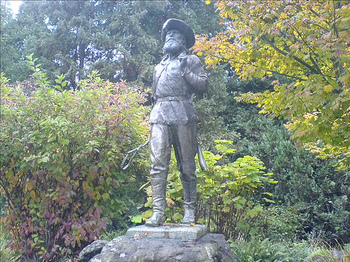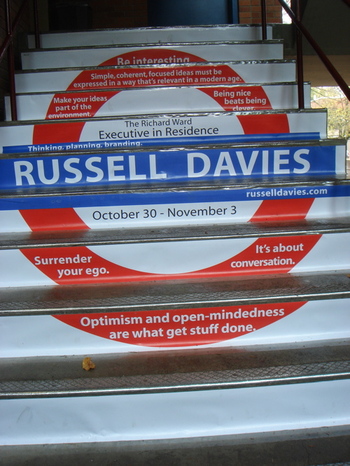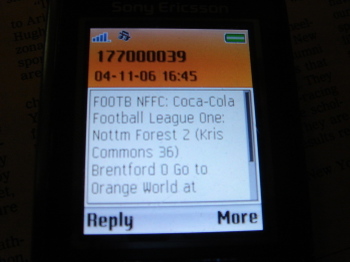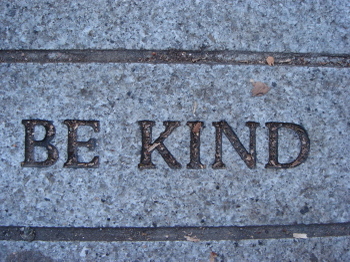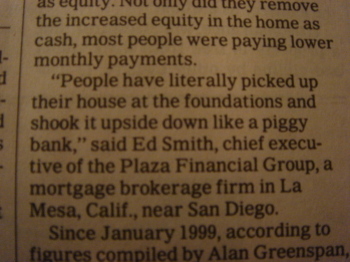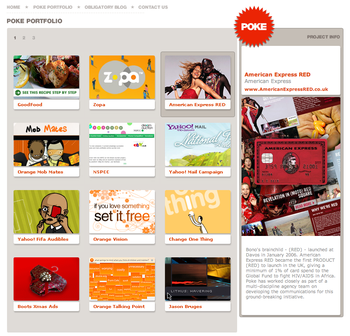I’ve just spent the last week at the University of Oregon. Working with undergraduate students and faculty at the advertising programme at the school of journalism. I was being an ‘executive in residence’.
The U of O is in Eugene, though it might make more sense to say the U of O is Eugene. It’s a lovely place. They spend a lot of time telling you about all the bits of Eugene that inspired various things on The Simpsons. (see above) And both the kids and the faculty were really nice and really welcoming. Smart kids too (is that too patronising?) Really engaged, enthusiastic and imaginative.
It’s very intimidating to arrive somewhere and come face to face with a large graphic of your name, with a collection of your 'sayings' like you’re a third world despot. Nice of them to make the effort though. (It’s also slightly embarrasing to be caught taking pictures of a graphic about yourself to put on your blog. That probably defines self-involved.)
Anyway, to the point.
It’s a long time since I’ve spent much time in an educational environment and it made me think about all sorts of things.
The students at the U of O are organised into a little volunteer ad agency called Allen Hall Advertising. They do pretty decent work for real clients and it must be an invaluable way to learn. They let me sit on an AHA meeting but it wasn’t long before I found myself starting to shatter their young dreams.
Because, in creating AHA, they’d very accurately recreated the infrastructure and heirachies of JWT in 1986. (Not specifically, but you know what I mean.) They were operating in a way that even big dumb agencies are trying to stop doing. They were preparing themselves for a world of work that doesn’t exist any more, or at least, won’t exist soon. I suggested, probably thoughtlessly, that they not worry about who was an ACD or an account person and start thinking about creative business problems they’d like to solve and start solving them. In small multi-disciplinary teams. Quickly.
And it soon becomes apparent that this issue goes a lot broader. Their course is designed to churn out mini-art directors, mini-account people, mini-planners for a world that increasingly just wants creative generalists. We have no idea what the world of work will be like or 5 or 10 years, but I suspect it won’t be like JWT in the 80s.
(Though I guess the lucky thing about advertising is it’s quite a flexible activity anyway so it’s not like they’re learning anything that won’t be useful. They’re not studying to be steam engineers or top hat makers, but it’s not so much about the skills they learn, it’s how they learn to apply them.)
Anyway.
The faculty at the U of O are smart enough to have figured this out and they’re working against the institutional friction to create something appropriate for the 21st century (I suspect they got me in to cause this sort of trouble, maybe even to write a post like this) but it’s going to be a struggle. We’re heading for a multi-disciplinary world and that butts right up against a university business model. If I were preparing myself for my job right now I’d do classes in film editing, poetry, statistics, anthropology, business administration, copyright law, psychology, drama, the history of art, design, coffee appreciation and a thousand other things. Colleges don’t want you doing that, that destroys all their efficiencies, but it’s what they’re going to have to work out.
(Good signs include a course that they're going to teach about Curiosity, that sounds like something I’d like to have done.)
I suggested the best thing they could do is get in touch with Steve at Creative Generalist and get his advice so Steve, you might be getting a call.
But everyone keep your eye on the U of O, with some good luck and some hard work they might transform themselves from a pretty decent ad school into a supplier of high-class creative generalists.
Interestingly, as well as having visited the U of O last week, I’m also on the board of VCU adcenter and I’ve been exchanging emails with people there about a similar dilemma. They’ve been watching the world change too and have created a new track called ‘Creative Brand Management’- this is a response to the idea that traditional MBAs are really poorly equipped to handle the increasingly creative requirements of the modern business world - having ideas, managing creative projects, working with aesthetic decisions, etc. In essence these are the brand managers, communications managers etc of the future. I guess they’re like regular marketing students but they’re more used to collaboration with creative people etc.
This seems like a smart idea to me but obviously it’s quite a new idea and most client organisations have never heard of adcenter so they’re looking for help and ideas in helping these people get out into the world. Where can they get internships? How should they market themselves? All that sort of stuff. One of the students is thinking about all this and emailed me with questions. Sadly my one year as a client doesn’t really equip me to answer them very well, so I said I’d try and help by putting some of the questions up here.
If anyone has any views or suggestions I’d very grateful if you’d post them in the comments. These are the questions:
1. For the CBMs, part of the struggle is the relative anonymity of the Adcenter in the client world. From a typical client perspective, what do you think is the most attractive way to describe the educational process as it differs from traditional B-schools? Should this "sell" work its way onto a student's resume, or is there another way to make these points to an employer who may have zero prior knowledge? What types of materials should complement our resume as a track-information provider (i.e., a thorough Web site, a downloadable brochure, etc.)?
2. What, specifically, do you look for in the resume of someone who will work on your brand team? Do you expect a portfolio in addition to a resume? If so, what should be included?
3. We want to ensure that the title "Creative Brand Managers" isn't too limiting. Ideally, as graduates from this program, we will be equipped to manage a brand in myriad roles, including communication manager, marketing manager, project manager, brand analyst, among many others. Is the term "Creative Brand Manager" misleading to a recruiter? How explicit should we be with the title? What types of positions would you hire a student with a masters in "Creative Brand Management" for?
4. What are the skills mandatory from a new hire to work on anything that touches your brand? What are some ideal skills you'd like to see but rarely do?
5. In closing, how can we go about having companies find us in the future? What can we do to spread the word about this one-of-a-kind program?
So that's it. Any suggestions or thoughts very welcome.

